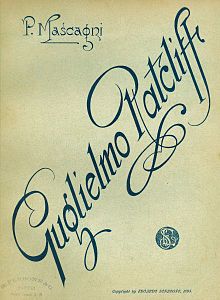Guglielmo Ratcliff
| Work data | |
|---|---|
| Title: | William Ratcliff |
| Original title: | Guglielmo Ratcliff |

Title page of the libretto in the original edition (1895) |
|
| Shape: | Opera in four acts |
| Original language: | Italian |
| Music: | Pietro Mascagni |
| Libretto : | Andrea Maffei |
| Literary source: |
Heinrich Heine : William Ratcliff |
| Premiere: | February 16, 1895 |
| Place of premiere: | Teatro alla Scala , Milan |
| Playing time: | about 2 hours |
| Place and time of the action: | Scotland, 19th century |
| people | |
|
|
Guglielmo Ratcliff is an opera in four acts by Pietro Mascagni . Most of it was completed before Mascagni's success Cavalleria rusticana (premiered in 1890) and is therefore considered his first opera. The libretto is by Andrea Maffei based on the tragedy William Ratcliff by Heinrich Heine , which was published in 1823. The premiere took place on February 16, 1895 at the Teatro alla Scala in Milan . Guglielmo Ratcliff was Mascagni's favorite opera, and the title character is considered an extraordinarily demanding tenor role. An orchestral piece Andante lento e sostenuto in the middle of the third act became known as an intermezzo (also titled Il sogno di Ratcliff , "Ratcliff's Dream") and was used in the film music for Wie ein Wilder Stier .
action
The approximately two-hour, tragic-romantic opera is set in the north of Scotland around 1820 .
first act
Count Douglas, Mary's fiancé, arrives at the castle of Lord MacGregor, Mary's father. He tells how he was attacked near criminals and rescued by an unknown knight. Maria faints, but quickly recovers. MacGregor tells Douglas about Maria's unsuccessful admirer Gugliemo Ratcliff. In revenge, Ratcliff called the two closest suitors of Maria to a duel and killed them. MacGregor reports that Ratcliff also challenged Douglas to a duel at Black Rock, as Lesley told him.
Second act
In a pub frequented by criminals and swindlers, the landlord Tom holds his son Willie on his lap and asks him to pray the Our Father. When the latter merely quotes “And don't lead us into temptation”, his angry father sends him out with the comment that he will end up like the guests in the pub. Meanwhile, in the guest room Ratcliff tells his friend Lesley how Maria's rejection annoys him and that he will kill anyone who wins her heart, like her two admirers before, whose ghosts have haunted him since then.
Third act
Douglas arrives at Black Rock, the place where Ratcliff plans to duel with him. When Ratcliff arrives, Douglas realizes that he is the knight who saved him from the criminals. Douglas wins the duel, but refuses to kill the battered Ratcliff.
Fourth act
In her apartments, Maria prepares for the wedding to Douglas. Meanwhile, her assistant Margherita tells her about the death of Mary's mother, Elisa, and her unhappy love story with Edward, Guglielmo Ratcliff's father. Before getting married to MacGregor, which was a mistake, Elisa and Edward were lovers, but each married different partners. But since they could not leave each other, they had a secret love affair. When MacGregor found out, he killed Edward, and Elisa died of grief.
The bleeding Gugliemo Ratcliff enters the room and asks Maria to go with him. The story of her mother still in front of her eyes, Maria ponders briefly, but then asks Ratcliff to leave. He gets angry and kills Maria and her father who rushes up. Then he kills himself. The opera ends with his last words “O Maria, vengo a te! Son qui, soave Maria! "(" O Maria, I come to you! I am here, my sweet Maria! ")
Emergence
Guglielmo Ratcliff is Mascagni's first opera and was completed in 1888 parallel to his appointment as conductor of the orchestra in Cerignola . At first, no impresario was enthusiastic about the first work, but this only changed after Mascagni's breakthrough with Cavalleria rusticana a year later. In 1895 Guglielmo Ratcliff was then premiered in Milan with great success. Heinrich Heine's tragedy thus served as a template for three operas in addition to César Cui's opera William Ratcliff (1861–1868) and Volkmar Andreae's opera Ratcliff from 1914.
literature
- Roger Flury: Pietro Mascagni: a bio-bibliography . Greenwood Press, Westport CN 2001, ISBN 0-313-29662-6 . (Appendix: W4 Guglielmo Ratcliff (1895) in the Google book search)
- Heinrich Heine: William Ratcliff . In: Tragedies and a lyric interlude . Dümmler, Berlin 1823. (literary source)
- Alan Mallach: Pietro Mascagni and his operas . Northeastern University Press, Boston 2002, ISBN 1-55553-524-0 . (Chapter 2: Student, Wandering Musician and Guglielmo Ratcliff , 1882–1887 in Google Book Search)
Web links
- Guglielmo Ratcliff : Sheet Music and Audio Files in the International Music Score Library Project
- Guglielmo Ratcliff (Pietro Mascagni) in the Corago information system of the University of Bologna
- Libretto on the Mascagni.org website (Italian)
- Storyline and cast at Boosey & Hawkes music publisher
- Work data for Guglielmo Ratcliff based on MGG with discography at Operone
- Sound recordings by Pier Miranda Ferraro with parts from Guglielmo Ratcliff (1963)
Individual evidence
- ^ A b Peter G. Davis: Fantaisie Guest . In: New York Magazine, December 15, 2003.
- ^ Notes on Guglielmo Ratcliff , The Genesis of a Masterpiece
- ↑ Mascagni.org ( Memento of August 30, 2007 in the Internet Archive )